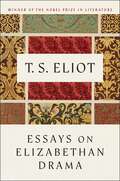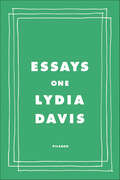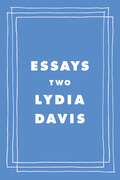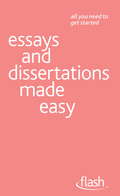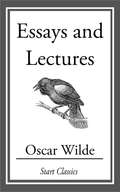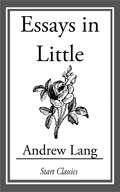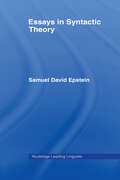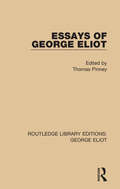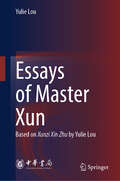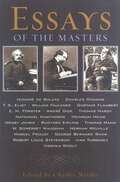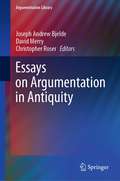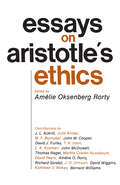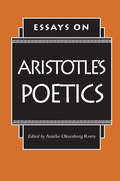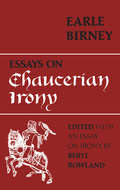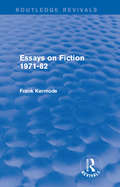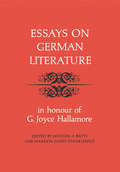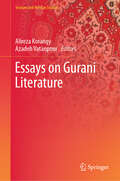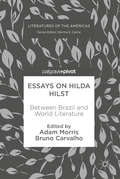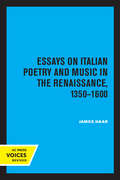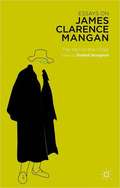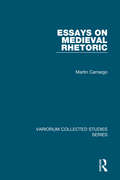- Table View
- List View
Essays On Elizabethan Drama
by T. S. EliotTouching on everyone from Marlowe to Middleton, Essays on Elizabethan Drama is a rigorous collection of Eliot’s works on the great dramatists of the 16th century.
Essays One: Reading And Writing
by Lydia DavisA selection of essays on writing and reading by the master short-fiction writer Lydia DavisLydia Davis is a writer whose originality, influence, and wit are beyond compare. Jonathan Franzen has called her “a magician of self-consciousness,” while Rick Moody hails her as "the best prose stylist in America." And for Claire Messud, “Davis's signal gift is to make us feel alive.” Best known for her masterful short stories and translations, Davis’s gifts extend equally to her nonfiction. In Essays One, Davis has, for the first time, gathered a selection of essays, commentaries, and lectures composed over the past five decades. In this first of two volumes, her subjects range from her earliest influences to her favorite short stories, from John Ashbery’s translation of Rimbaud to Alan Cote’s painting, and from the Shepherd’s Psalm to early tourist photographs. On display is the development and range of one of the sharpest, most capacious minds writing today.
Essays Two: On Proust, Translation, Foreign Languages, and the City of Arles
by Lydia DavisA collection of essays on translation, foreign languages, Proust, and one French city, from the master short-fiction writer and acclaimed translator Lydia Davis In Essays One, Lydia Davis, who has been called “a magician of self-consciousness” by Jonathan Franzen and “the best prose stylist in America” by Rick Moody, gathered a generous selection of her essays about best writing practices, representations of Jesus, early tourist photographs, and much more. Essays Two collects Davis’s writings and talks on her second profession: the art of translation. The award-winning translator from the French reflects on her experience translating Proust (“A work of creation in its own right.” —Claire Messud, Newsday), Madame Bovary (“[Flaubert’s] masterwork has been given the English translation it deserves.” —Kathryn Harrison, The New York Times Book Review), and Michel Leiris (“Magnificent.” —Tim Watson, Public Books). She also makes an extended visit to the French city of Arles, and writes about the varied adventures of learning Norwegian, Dutch, and Spanish through reading and translation. Davis, a 2003 MacArthur Fellow and the winner of the 2013 Man Booker International Prize for her fiction, here focuses her unique intelligence and idiosyncratic ways of understanding on the endlessly complex relations between languages. Together with Essays One, this provocative and delightful volume cements her status as one of our most original and beguiling writers.
Essays and Dissertations Made Easy: Flash
by Hazel HutchisonThe books in this bite-sized new series contain no complicated techniques or tricky materials, making them ideal for the busy, the time-pressured or the merely curious. Essays and Dissertations Made Easy is a short, simple and to-the-point guide to applied psychology. In just 96 pages, the reader will learn all about why we do the things we do. Ideal for the busy, the time-pressured or the merely curious, Essays and Dissertations Made Easy is a quick, no-effort way to break into this fascinating topic.
Essays and Dissertations Made Easy: Flash
by Hazel HutchisonThe books in this bite-sized new series contain no complicated techniques or tricky materials, making them ideal for the busy, the time-pressured or the merely curious. Essays and Dissertations Made Easy is a short, simple and to-the-point guide to applied psychology. In just 96 pages, the reader will learn all about why we do the things we do. Ideal for the busy, the time-pressured or the merely curious, Essays and Dissertations Made Easy is a quick, no-effort way to break into this fascinating topic.
Essays and Lectures
by Oscar WildeThe Rise of Historical Criticism The English Renaissance of Art House Decoration Art and the Handicraftman Lecture to Art Students London Models Poems in Prose
Essays in Little
by Andrew LangAlexandre Dumas -- Mr. Stevenson's works -- Thomas Haynes Bayly -- Theodore de Banville -- Homer and the study of Greek -- The last fashionable novel -- Thackeray -- Dickens -- Adventures of Buccaneers -- The sagas -- Charles Kingsley -- Charles Lever: his books, adventures and misfortunes -- The poems of Sir Walter Scott -- John Bunyan -- Letter to a young journalist -- Mr.Kipling's stories
Essays in Syntactic Theory (Routledge Leading Linguists #No.5)
by Samuel David EpsteinThe essays in this important collection explore wide-ranging aspects of the syntax and semantics of human languages. Key topics covered include movement phenomena and the syntax of logical form, methods in generative linguistics and the role of rules vs. principles in syntactic theory. This volume makes a vital contribution to substantive and methodological debates in linguistic theory.
Essays of George Eliot (Routledge Library Editions: George Eliot)
by Thomas PinneyThis collection, first published in 1963, includes 29 of George Eliot’s essays written between 1846 and 1868. Through these essays, Pinney has managed to convey her range of subject-matters and variety of style. This title, with an introduction and footnotes written by the editor, will be of particular interest to students of literature.
Essays of Master Xun: Based on Xunzi Xin Zhu by Yulie Lou
by Yulie LouThis is the first book written by Chinese scholars with more accurate interpretation of Master Xun’s philosophy and quoted texts from other Chinese classics. Master Xun is one of the greatest Confucian philosophers of the classical period in China. His thought has been exercising a profound impact on ideology, academic research, social and political system, ritual and moral principles, as well as the practical aspects of personal self-cultivation, education and learning. After reading the book, the readers will understand thoroughly the ancient Chinese philosophy.
Essays of the Masters
by Charles NeiderThis unorthodox but delightful anthology of 42 essays focuses on the masters of world literature—writers best known for novels, plays, and poems—and how they put the essay to their personal use. Contributors include Auden, Balzac, Conrad, Dickens, Dostoevski, Eliot, Faulkner, Flaubert, Gide, Goethe, Hardy, Hawthorne, Heine, Hemingway, Kafka, Kipling, Lawrence, Melville, Pirandello, Poe, Proust, Sartre, Tolstoy, Twain, Whitman, Wilde, Woolf, and Yeats.
Essays on Argumentation in Antiquity (Argumentation Library #39)
by Joseph Andrew Bjelde David Merry Christopher RoserThis book provides a collection of essays representing the state of the art in the research into argumentation in classical antiquity. It contains essays from leading and up and coming scholars on figures as diverse as Parmenides, Gorgias, Seneca, and Classical Chinese "wandering persuaders." The book includes contributions from specialists in the history of philosophy as well as specialists in contemporary argumentation theory, and stimulates the dialogue between scholars studying issues relating to argumentation theory in ancient philosophy and contemporary argumentation theorists. Furthermore, the book sets the direction for research into argumentation in antiquity by encouraging an engagement with a broader range of historical figures, and closer collaboration between contemporary concerns and the history of philosophy.
Essays on Aristotle's Ethics (Philosophical Traditions #2)
by Amélie Oksenberg RortyAristotle's Nicomachean Ethics deals with character and its proper development in the acquisition of thoughtful habits directed toward appropriate ends. The articles in this unique collection, many new or not readily available, form a continuos commentary on the Ethics. Philosophers and classicists alike will welcome them.
Essays on Aristotle's Poetics
by Amélie Oksenberg RortyAimed at deepening our understanding of the Poetics, this collection places Aristotle's analysis of tragedy in its larger philosophical context. In these twenty-one essays, philosophers and classicists explore the corpus of Aristotle's work in order to link the Poetics to the rest of his views on psychology and on history, ethics, and politics. The essays address such topics as catharsis, pity and fear, pleasure, character and the unity of action, and the modality of dramatic action. In addition to the editor, the contributors are Elizabeth Belfiore, Rdiger Bittner, Mary Whitlock Blundell, Wayne Booth, Dorothea Frede, Cynthia Freeland, Leon Golden, Stephen Halliwell, Richard Janko, Aryeh Kosman, Jonathan Lear, Alexander Nehamas, Martha C. Nussbaum, Deborah Roberts, G.E.M. de Ste. Croix, Nancy Sherman, Jean-Pierre Vernant, Stephen A. White, and Paul Woodruff.
Essays on Chaucerian Irony
by Earle Birney Beryl RowlandThese essays, written between 1937 and 1960, have remained classics of their kind. They include important discussions on irony--its native traditions and its occurrence in early English literature, an account of critics' appreciation of Chaucerian irony prior to this century, and a detailed examination of four of the Canterbury Tales. The illuminating analysis of the complex use of various kinds of irony in the Miller's Tale, the Friar's Tale, the Summoner's Tale, and the Manciple's Tale emphasizes aspects of Chaucer's art that are very acceptable to contemporary. As a result, these essays lead today's reader towards a fuller understanding of Chaucer's achievement.
Essays on Eddic Poetry
by John Mckinnell Donata Kick John ShaferEssays on Eddic Poetry presents a selection of important articles on Old Norse literature by noted medievalist John McKinnell. While McKinnell's work addresses many of the perennial issues in the study of Old Norse, this collection has a special focus on the interplay between heathen and Christian world-views in the poems.Among the texts examined are Hávamál, which includes an elegantly cynical poem about Óðinn's sexual intrigues and a more mystical one about his self-sacrifice on the world-tree in order to gain magical wisdom; Vǫlundarkviða, which recounts an elvish smith's revenge for his captivity and maiming; and Hervararkviða, where the heroine bravely but foolishly raises her dead father to demand the deadly sword Tyrfingr from him.Originally published between 1988 and 2008, these twelve essays cover a wide range of mythological and heroic poems and have been revised and updated to reflect the latest scholarship.
Essays on Fiction 1971-82 (Routledge Revivals)
by Sir Frank KermodeIn this book, which was first published in 1983, Frank Kermode looks in particular at the revived Russian Formalism, a highly original body of literary theory that flourished in the years immediately following the Revolution, and at the work of Roman Jakobson, one of its most distinguished exponents. He discusses its modern ‘structuralist’ descendants, recalling the importance of Roland Barthes and the invigorating effect of his fertile and surprising mind. He considers also the work of Foucault, Laca and Levi-Strauss, as well as that of Jacques Derrida, which uses a novel and de(con)structive method of analysis to question to tacit assumptions on which structuralism is based. In an opening chapter, Professor Kermode surveys his relationship with the new theory, explaining that it is a relation from which he has benefited without ever feeling disposed to join a movement. These essays will be of interest to students of literature.
Essays on German Literature: In Honour of G. Joyce Hallamore
by Michael S. Batts Marketa Goetz StankiewiczThe present Festschrift serves a dual purpose: firstly, to honour Professor Joyce Hallamore for her contribution to German studies in Canada, particularly at the University of British Columbia; secondly, to document the flourishing state of German studies in this country. Former and present students of Professor Hallamore were asked to contribute essays from their varied fields of interest which she has stimulated and fostered; furthermore, colleagues across Canada were invited to contribute the results of their research: the broad theme of this second group of essays is the complex relationship between nineteenth and twentieth century literature which has been the centre of Professor Hallamore's own scholarly work.<P><P> This volume commemorates Professor Hallamore's forty years of scholarship and teaching--the time given by her to the University of British Columbia, not only to the formation and growth of the Department of German (which she has headed for some twenty years) but to the expansion of the University as a whole. It demonstrates at the same time through breadth and variety the coming of age of German studies in Canada, which Professor Hallamore has fostered.<P>Although the essays in this volume vary in approach, the result shows a remarkable harmony of outlook, which gives evidence of the authors' conscious effort to reconsider critically traditional categories and attitudes in literary criticism. This harmony of outlook--found in the whole range of papers from the youngest to the most mature scholar--reflects the spirit and work of the person whom the volume is honouring.
Essays on Gurani Literature (Iranian and Persian Studies)
by Alireza Korangy Azadeh VatanpourThis volume offers a new perspective on the Zagros region literary tradition. Gurani literature boasts a collection of the region&’s oldest oral and written literary traditions. Despite its significance, the repertoire and its essential function in the preservation and transmission of historical, cultural, and literal data of the Guran region&’s population has mostly remained unexplored. This volume represents various Guran regions on the southeastern and southern fringes of Kurdish territory and touches upon broad themes of oral and written texts, including epics, folktales, religious texts, poetry, and romances. These detailed and ground-breaking contributions will be an invaluable source for facilitating further research on the Gurani literary tradition; as well as being a significant guide to studying its impact on Persian and Zagros region literary history. Furthermore, this work will provide the reader with a new perspective and insight into the complexity and variety of literature in the Persianate world, moving toward a more inclusive view of literature.
Essays on Hilda Hilst: Between Brazil And World Literature (Literatures of the Americas)
by Adam Morris Bruno CarvalhoThis book is the first collection of critical essays on Hilda Hilst (1930-2004) published in English. It brings together a variety of perspectives on one of Latin America’s most inventive and innovative authors. Nine essays by scholars and translators reflect about various aspects of her work, placing it in the context of Brazil and world literature. During her lifetime, Hilst won several major national literary awards and attracted legions of devoted readers. Her writing spanned styles and genres, encompassing poetry, theatre, and experimental fiction. She was also considered to be “a writer’s writer,” and her literary achievements eluded both mainstream acclaim and international recognition. In recent years, Hilst’s books have enjoyed increased visibility in Brazil and beyond. A host of translators (including three contributors to this volume) have finally made some of her masterpieces available in English. This pioneering collection of essays should excite longtime readers and introduce her to a new audience.
Essays on Italian Poetry and Music in the Renaissance, 1350-1600 (Ernest Bloch Lectures #5)
by James HaarThese essays illuminate the changing nature of text-music relationships from the time of Petrarch to Guarini and, in music, from the madrigals of Giovanni da Cascia to those of Gesualdo da Venosa. Haar traces a line of development from the stylized rhetoric of Trecento song through the popularizing trends of Quattrocento music and on to the union of verbal and musical cadence that marked the high Renaissance in sixteenth-century Italian music. This title is part of UC Press's Voices Revived program, which commemorates University of California Press’s mission to seek out and cultivate the brightest minds and give them voice, reach, and impact. Drawing on a backlist dating to 1893, Voices Revived makes high-quality, peer-reviewed scholarship accessible once again using print-on-demand technology. This title was originally published in 1986.
Essays on James Clarence Mangan: The Man in the Cloak
by Sinéad SturgeonThis is the first collection of essays to focus on the extraordinary literary achievement of James Clarence Mangan (1803-1849), increasingly recognized as one of the most important Irish writers of the nineteenth century. It features contributions by acclaimed contemporary writers including Paul Muldoon and Ciaran Carson.
Essays on Medieval Rhetoric (Variorum Collected Studies #1006)
by Martin CamargoOriginally published between 1981 and 2003, the thirteen essays collected here cover topics in medieval rhetoric from its origins in late antiquity through the end of the Middle Ages. Most of the essays are concerned with the teaching of prose composition, especially the art of letter writing known as the ars dictaminis, and many of them focus on specific textbooks that were used for such instruction, in particular those composed in England from the twelfth through the fifteenth centuries. Individual essays are devoted to works by major figures such as Saint Augustine, Peter of Blois, and Geoffrey of Vinsauf; to teaching programmes at important academic centres such as Oxford and Bologna; and to such topics as the relationship between the art of letter writing and the art of poetry, the oral dimension of medieval epistolography, the manuscript traditions of influential textbooks, medieval genre terminology, and the position of medieval rhetoric within a continuous disciplinary history rooted in classical rhetoric.

